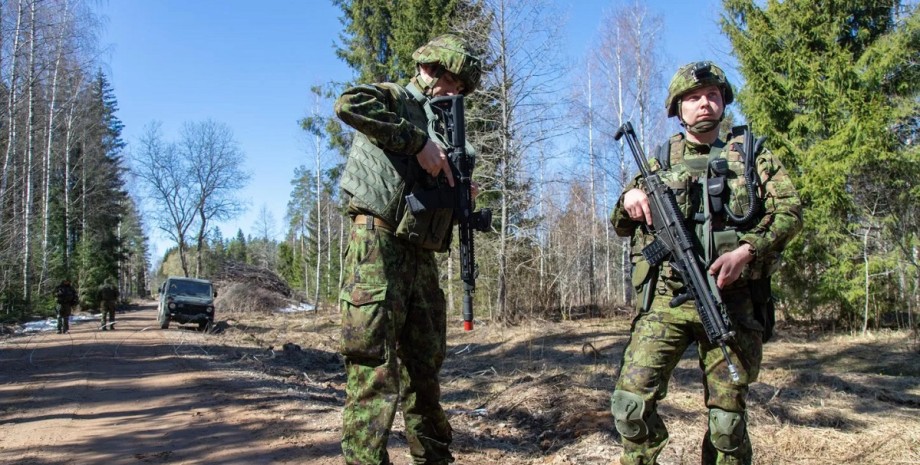
And the Estonian Island of Kiyumaa is preparing for the worst scenario, since its inhabitants are aware of the strategic importance of their small apartment, because the area of Higium is only 1000 square kilometers. Heltermaa is the most important port on Hiumaa. There are less than 50 people in the city.
From the Great Island off the coast of Estonia, Russia could install a naval blockade in the Kaliningrad region and divide NATO countries - Baltic countries on the one hand, Finland and Sweden on the other - and control the Baltic Sea. Hiaumaa is located halfway between St. Petersburg and the Russian enclave, two bases of the Russian military fleet. The mayor of the island, Hergo Tasuya, believes that Kiumuma - in Putin's occupation plans, but is skeptical.
"We know that the Russians seek to dominate the sea. But the occupation of Kiumuma is not so easy. In our whole history, we have been attacked by Russia dozens of times. We have this knowledge in the blood, and we are ready to defend the island," he says. Now the island is being installed in the west of the island, which will be able to detect any movement in the Baltic Sea. In addition, there are civil defense units throughout Estonia. "I am one of them too.
We have weapons and we are trained to use it," the mayor says. According to him, the island is constantly training, and here everyone knows that you need to stay at least 48 hours, then you can expect help. Attacking on Kiuuma and a simultaneous attack on the Estonian border city of Narva at the other end of the country is a script developed by Carlo Masala, a German military expert and a professor of political science at the Bundesver University in Munich.
In his latest book "If Russia Wins" he describes the Russian army's offensive on the northeast NATO flank in 2028. This happens if the war in Ukraine ends with the capitulation of Kiev, and the disunity within NATO is pushing Russia to a new attack. The main city of Kiuuma, the cars, you can cross about half an hour. Many residents of the island work on the mainland on weekdays, and houses are used only as residences on weekends.
Those who reside on Khiumaa are earning a living with agriculture, summer tourism, fishing or navigation. And all the inhabitants say that after the victory of Donald Trump in the US elections, living on the island has become more anxious. Because they read the book of massla. "They are preparing. Many have thought they were safe, but Trump's re -election and current policies show us that the story is unpredictable," says Port Anne Head. In the Soviet times, Hiaumaa was a closed military zone.
The Soviet authorities built missile bases and other defensive structures there, and residents were relocated. In 1991, Estonia became independent again and people returned to the island. 64-year-old lawyer Ain Diahiste leads excursions to the island, where the remains of bins and army equipment have been preserved since both world wars.
Only a map in the museum, which indicates the commemorative places of fighting that took place on Khiumaa, gives an idea of the cruel times that this island has survived. Dahhiste believes that Russian soldiers will not be able to keep the island for a long time because of a lack of supplies. However, he believes that this situation should not occur at all. Because Russia is weakened by the war in Ukraine, and if sanctions against the country persist and intensify, the Russians will exhale.
He may think of more experience of communicating with the Russians in the Baltic States, and they are not as easy to intimidate as the rest of Europe. "The fact that Russia works strongly does not mean that it is really strong. It's all fairy tales," he says. The 55-year-old Roman Lucas, the former Marines, has no doubt that Putin's next goal may be Estonia and Kiyumaa Island.
But now he is doubting the capacity and determination of NATO to protect the Allies, especially during Trump's presidency and long -term telephone conversations between Trump and Putin. "We needed an alternative to NATO, a purely European military alliance," he said. The script of the massla ends poorly. Following Russia's attack on Estonia, NATO members quickly consulted, as required by Article 5 of the NATO treaty, and decided not to impose a state of emergency.
They do not want to wage war for the island and the border city. Thus, the military alliance has lost its efficiency. Moscow's leadership celebrates. "I do not believe in such a scenario," says Hergo Tasua. But the Baltic countries are rapidly equipped. Estonia plans to invest an additional 2. 8 billion euros over the next four years. This will increase defense costs from 3. 4% to about 5. 4% of the gross domestic product by 2029.
Money will be invested in new missiles, modern air defense systems and communications, as well as additional troops. Recall that in a recent interview former US President Donald Trump Adviser John Bolton suggested that if the United States decides not to use force in response to Russia's aggression against NATO member state. Earlier it became known that Moscow is pulling troops to the border with Finland.










All rights reserved IN-Ukraine.info - 2022